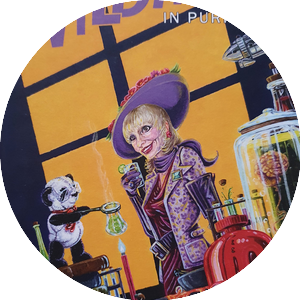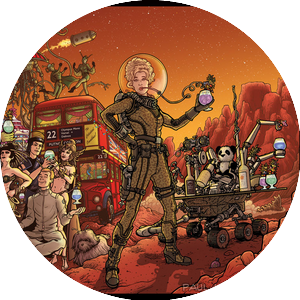Invitation
When I was writing The Albino’s Dancer, the publishers let me see the final drafts of the two novellas that would precede mine in the Time Hunter series: Deus le Volt and Peculiar Lives. Reading the latter, I decided that I was a fan of its author, Philip Purser-Hallard … although – as writers active in online Doctor Who fandom – we had already crossed paths:
We’d been on various mailing lists together for years, and I’d known your writing since, I think, we were both published in the Doctor Who fan anthology Walking in Eternity (although I’m embarrassed to say I can’t remember a thing about your story there).
Philip had already had a short story sequel to his excellent Of City of the Saved … novel published by Observe Books, and they asked if he’d be interested in editing an anthology set with the City. Philip asked me if I’d be interested in writing one of the stories because:
I’d read your short stories, novels and novella, and loved your thoughtful approach to a variety of source material … I wanted to recruit writers who had impressed me in the past, but also ones who I thought would do something innovative yet faithful to the City of the Saved setting.
The things I’d written before had impressed Philip … and not just the high-profile Doctor Who books, but short stories like Driftwood in Short Trips: Transmissions. But there was another reason why the things I’d written before made Philip come to me:
Your relatively high profile was a factor – though many of the authors I approached had some mileage in Doctor Who, you were the only one who’d written a new series novel, and I hoped your name would have more recognition value.
It wasn’t the main reason, but having a credit that the audience might have heard of made me more attractive to the editor.
Inspiration
The major influence on the story was Philip Purser-Hallard himself. The aforementioned Of The City of the Saved … was filled with such invention and atmosphere that it was almost a surprise to find that it also established the City as a very real, very possible place. As a writer that feels more comfortable with a story if a little historical research can be done, a future SF world where everybody who had ever lived is reborn after death was an appealing setting. As a writer who likes coming up with oddball characters and talking about the proper place for a fear of dying, it was probably inevitable that I’d write something set in the City.
But Philip also created a very credible version of Post-Humanity in Peculiar Lives and the linking pieces he wrote for Collected Works. With the City being the City, I knew that this society would also be available, and the idea of tying together three of Philip’s works for him appealed to me.
The other major influence on the story was Kurt Cobain. I’d researched him for another story that is theoretically sold and awaiting publication, and as a character he was still hanging around in my thoughts. I knew that I wanted to write about somebody who had killed themselves waking up in an immortal afterlife, to work through exactly what you’d do with eternity if Heaven does exist. Kurt suggested Jane Dick, who had died very soon after being born: she was the brother of writer Philip K Dick, and I knew that Philip and I shared an interest in his life.
Getting the Story
Philip specified a format for pitches for Tales of the City, which dictated how I came up with the story. Normally with a short story, I have a vague idea of what I want to write and sometimes even an idea of how I want it to end. Then I sit down and write my way through it, trusting the possibility of rewriting or even restarting to keep the story in shape. But Philip was asking for two pages, giving a character breakdown and a rough outline, so this story was thought through a little more before I started.
The characters were Jane Dick and Kurt Cobain, but I also intended Edmund Ruffin – a soldier on the wrong side of the American Civil War who had also killed himself – to have a larger role. When I wrote the story, he ended up only getting a scene as Kurt and Jane’s relationship took centre-stage instead. I wrote a brief synopsis that contained most of the beats of the story, but ended up differing slightly from the final story: Einstein and Philip K Dick worked their way into the story, and Kurt finding a way to commit suicide again worked its way out.
The Pitch
The pitch was sent back to Philip within the two-week deadline he’d set, and shortly after that he got back in touch and said he wanted me to write the story. He liked the pitch because:
It stuck in my head immediately as being an idea I really should have had myself. Philip K Dick has been an important figure in the City of the Saved material as far back as its inception in The Book of the War, but it had never occurred to me to write a story around his twin sister, Jane … To be honest, from that point your story was pretty much a shoe-in, but I was also pleasingly disturbed by the way you developed that initial concept, with Jane still trapped in her six-week-old body, and the frustrated suicides she surrounded herself with. I wanted some stories which looked at the darker aspects of the City’s existence, and your proposal was pretty much perfect for that.
The story was written in about a week. It had its own ideas about its shape and tone, but – except for a few alterations – the version in the final book is the one that was written in that week.
Editorial
There were some clarifications that Philip made after accepting the synopsis that were worked into the final story. These mainly concerned the City’s status as a shared universe: I’d misremembered some details of how the immortality worked that needed to be consistent, and Philip wanted to keep the options for future stories open by making clear that not all infant mortalities resurrected in the City develop as Jane Dick did. When the first draft was delivered, Philip also thought that the relatively unknown Ruffin didn’t make his story and philosophy clear enough – his speech to Kurt was expanded to give a logical refutation of the idea that the City was Heaven.
There was one other editorial request made, and that was that Philip wanted to use Jane in the epilogue of the book in a way that moved the character away from where I’d left her. Philip wanted to check I didn’t mind my character being altered, and I took the view I usually take working in a shared universe: as long as the character is who I want them to be and does what I want them to do in my story, another writer can use them however they like afterwards.
However, this was a moment where I could perhaps have dug in.
If you’d had issues with how I treated Jane, I’d have rewritten the epilogue to accommodate them, or possibly asked you to write that bit for me. She’s your character (well, apart from being historically real), and I didn’t want any contributors looking back on the anthology with a bad taste in their mouth.
There is always scope to argue your side with an editor, and if I’d have felt strongly about it I could have said something without affecting the relationship. But then there is also a risk if you are too belligerent:
If you’d been a total prima donna about it, I might have had to overrule you, but I’d have done my best to avoid it coming to that.
At the end of the day, it’s only worth taking that risk if you really, really think you have to. And in this case, Philip’s idea gave the character an extra twist that I don’t think I would have ever have thought of: if there’s even a slight chance I might get the credit for his idea, then I’m all for that.
What Happened Next?
Following the book coming out, there was a second volume of City stories published that I wasn’t asked to pitch for. But the relationship with both Philip and Obverse remains strong: asked if he would work with me again, Philip said:
Absolutely. In fact there’s a specific project I have in mind which I’m hoping I can entice you into doing some work for. Let’s talk.
This turned out to be the collection Iris Wildthyme of Mars that Philip edited for Obverse Books, and for which I wrote a story. I’m also talking to Obverse about something which will hopefully see me writing something slightly longer for them soon.


